Distinguished Ethnobiologist Award
Distinguished Ethnobiologist Award
The Society of Ethnobiology announces its Distinguished Ethnobiologist award to honor an ethnobiologist who has made outstanding contributions to the field of ethnobiology and advancing the goals of the Society. In recognition of these contributions, the recipient will be awarded a lifetime honorary membership to the Society of Ethnobiology. The recipient of the award (or in special circumstances, a representative of the winner) shall present an address at the annual meeting the year of his/her/their selection. Lodging for the duration of the conference and conference registration fee will be covered by the Society of Ethnobiology. Please submit the nomination materials electronically by November 15 December 15:
- a letter of nomination of no more than 500 words, including a short biographical sketch of the nominee, and
- a current CV of the nominee.
The nomination materials can be submitted via the online nomination form. Questions? Contact awards@ethnobiology.org
Application form is now closed.
DEB Recipients:
- 2024 Dr. Harriet Kuhnlein
- 2023 Dr. William Balée
- 2022 Dr. Dana Lepofsky
- 2021 Dr. Paul Minnis
- 2020 Dr. Deborah Pearsall
- 2019 Dr. Nancy Turner
- 2018 Dr. Gail Wagner
- 2017 Drs. Steve Emslie and Steve Weber
- 2016 Dr. Gary Nabhan
- 2015 Dr. Cecil Brown
- 2014 Dr. Gene Hunn
- 2013 Dr. Gene Anderson
- 2012 Dr. Catherine (Kay) Fowler
- 2011 Dr. Richard Ford
2024 Dr. Harriet Kuhnlein
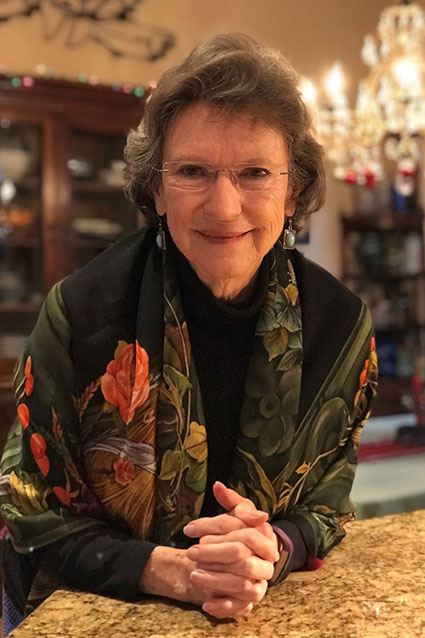 We are pleased to announce that the 2024 Distinguished Ethnobiologist is Dr. Harriet Kuhnlein. Please join us in St. Louis to celebrate her outstanding career in ethnobiology! As described by her colleagues in their nomination letter:
We are pleased to announce that the 2024 Distinguished Ethnobiologist is Dr. Harriet Kuhnlein. Please join us in St. Louis to celebrate her outstanding career in ethnobiology! As described by her colleagues in their nomination letter:
It is difficult to capture the immense breadth and depth of Harriet’s contributions, which are local, regional, and global in scope and span many decades. She has served on numerous government and professional advisory boards and on panels focusing on nutritional research and health and well-being of Indigenous Peoples, including children and youth, both in Canada and the US, and internationally.
Throughout her career, Harriet has worked tirelessly to promote Indigenous food systems, Indigenous health, and food security and sovereignty. She has documented Indigenous and Local Peoples’ food systems, nutrition, interventions for health benefits and related efforts to overcome the impacts of the global-scale “nutrition transition”. Her collaborations with Indigenous communities, Knowledge Keepers, and food experts worldwide are legendary. Her legacy is also apparent in her many students who have their own records of achievement in nutritional research and teaching.
Harriet has been a member of the Society of Ethnobiology since its inception, and has consistently attended our meetings with her students and colleagues, and presented papers and organized symposia on diverse subjects relating to food systems of Indigenous Peoples, worldwide. Recognized for her passion, extraordinary scholarship, kindness and generosity, we are thrilled to call her our 2024 Distinguished Ethnobiologist!
Harriet is a nutritionist and Founding Director of the Centre for Indigenous Peoples’ Nutrition and Environment (CINE) and Emerita Professor of Human Nutrition in the Faculty of Agricultural and Environmental Sciences, Macdonald Campus of McGill University, Montreal, Canada. Dr. Kuhnlein received her Ph.D. from the University of California, Berkeley, and holds an honorary Doctor of Laws degree from The University of Western Ontario. She is a Fellow of the American Society of Nutrition, an Honorary Member of the Nutrition Society of Canada, and a Fellow of the International Union of Nutritional Sciences (IUNS). Dr. Kuhnlein has been chair and co-chair of the IUNS Task Force on Indigenous and Traditional Food and Nutrition and was instrumental in the establishment of the United Nations Food and Agriculture Organization’s (FAO) Global-HUB on Indigenous Peoples’ Food and Knowledge Systems. Her participatory research with Indigenous Peoples’ food and nutrition began with the Hopi in 1974 and continued from her locations among the Coast Salish of Western North America and the Haudenosaune in Quebec. She has worked with more than 40 Indigenous cultures in the US, Canada and other parts of the world. Dr. Kuhnlein led research and publication of more than 400 articles, book chapters/proceedings and abstracts. In partnership with FAO, she has contributed to international case studies published and on-line at the FAO Indigenous Peoples’ repository of knowledge. With recognition as a Fulbright Specialist and several national and international awards Dr. Kuhnlein’s work continues with Indigenous Peoples to document food resources and surrounding knowledge and how this essential biocultural diversity must be protected and sustainable to enhance health and well-being.
2023 Dr. William Balée
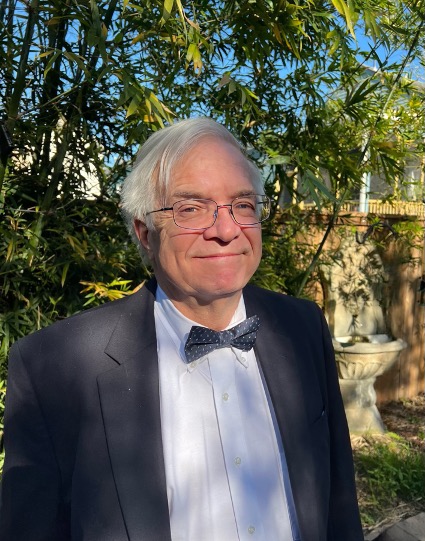 This year, the Society of Ethnobiology’s highest recognition of lifetime achievement, the Distinguished Ethnobiologist Award, has been awarded to Dr. William Balée. On behalf of the award committee, Bill, please accept our heartfelt congratulations and appreciation for your innumerous contributions to the field and Society!
This year, the Society of Ethnobiology’s highest recognition of lifetime achievement, the Distinguished Ethnobiologist Award, has been awarded to Dr. William Balée. On behalf of the award committee, Bill, please accept our heartfelt congratulations and appreciation for your innumerous contributions to the field and Society!
Bill’s nomination letter mentioned that he was a key player in formalizing the fundamental interdisciplinary nature of the modern field of ethnobiology. He has also been a key player in framing and nurturing the historical ecology research program. He was praised for reorienting anthropological and archaeological studies of Amazonia, from being focused on associating environmental constraints to the complexity of local societies, towards a constructionist approach that recognizes people as agents who manage and (re)construct landscapes. His work has helped introduce a new paradigm of Amazonia as an anthropogenic landscape that was densely populated.
Additionally, Bill’s service to the Society of Ethnobiology has been tireless, including serving as editor of the Journal of Ethnobiology, organizing conferences, and serving as President-elect and President, to name just a few. In each of these roles, he advanced the Society in so many ways—fostering integration among many generations of ethnobiology professionals and students and modelling the constructive exchange of ideas about alternative points of view.
Bill is an admired and cherished leader within our community. Throughout his career, he has demonstrated the ideal of sustained scholarly excellence and leadership, with humble dedication to supporting ethnobiology students both at his institution and in the Society. He seeks to bring members of our community with him as he advances the field so they also may become excellent scholars who contribute to the wonderful diversity of ethnobiology that is sustained by incredible collegiate unity between ethnobiologists. He exemplifies the highest ideals for our academic and community leaders.
Since 1998, Bill has been Professor of Anthropology at Tulane University, where he has advised many doctoral students and served in diverse capacities in service to his university and academic fields. Balée has been at the forefront of ethnobiological and ethnographic innovation since his time as a Research Fellow at the Institute of Economic Botany, New York Botanical Garden (1984–1988) and as an Associate Researcher at the Museu Paraense Emílio Goeldi in Belém, Brazil (1988–1991). Interacting with researchers of diverse specialties, he demonstrates and advocates for the vitality of a four-field approach to anthropology. His revolutionary intellectual synthesis had its roots in his intensive and lengthy fieldwork undertaken principally among the Tupi-Guarani speaking Ka’apor, which resulted in his now classic 1994 book Footprints of the Forest: Ka'apor Ethnobotany—The Historical Ecology of Plant Utilization by an Amazonian People (winner of Mary W. Klinger Award from the Society for Economic Botany). Balée continues to conduct research with the Ka'apor, whose language he fluently speaks. The implications of his work go far beyond academia, stimulating debates and public mobilization in defense of Indigenous territories and traditional knowledge as immemorial domains worthy of appropriate conservation legislation.
2022 Dr. Dana Lepofsky
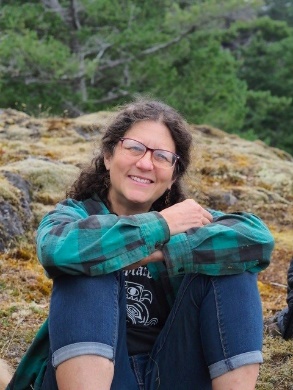
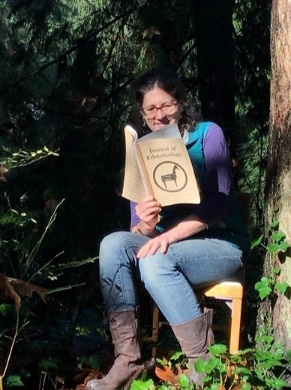
It is with much pleasure and admiration that I take this opportunity to announce that Dana Lepofsky was selected to receive the 2022 Society of Ethnobiology Distinguished Ethnobiologist Award. Dana, please accept our congratulations!
Dana’s nomination letter mentioned that in addition to being an exemplary scholar, meticulous researcher, and pathbreaking ethnobiologist, she has been instrumental in bringing about a paradigm shift in Northwest Coast studies whereby Indigenous peoples are now seen as intensive resource managers rather than “hunters and gatherers.” Many First Nations communities recognize that she brings warmth, support, cordiality, and collaboration to her relationships with them. Also, her service to the Society of Ethnobiology has been amazing, including hosting conferences, serving as President-elect and President, and editing the Contributions series and the Journal of Ethnobiology. In each of these roles, Dana advanced the Society in so many ways that she has become an admired and cherished leader within our community.
She did all these things with tremendous heart, humility, grace, and care for colleagues, students, and collaborators. Dana provides a shining example of what so many others aspire to be in and out of academic settings. We are thrilled to call her our Distinguished Ethnobiologist.
Dana is a professor of archaeology at Simon Fraser University. Her research interests include socio-ecological dimensions of human-environment interactions in the past and present, especially in the Northwest Coast. She works closely and collaboratively with several First Nations such as the Heiltsuk, Gitga'ata, Tla'amin, and Tseil-watuth in British Colombia. She is well-known for her work showing ecologically sustainable herring fishing and clam gardening to have deep histories linked to food security. Among her current projects, which she develops with students and local First Nations residents, are innovative and encompassing transdisciplinary initiatives based around cultural keystone places and their diverse non-human and human resources in the past, present, and future.
2021 Dr. Paul Minnis
It is with the utmost enthusiasm that we announce the 2021 Distinguished Ethnobiologist Awardee: Dr. Paul E. Minnis!!
A long-time member of the Society, Dr. Minnis served as the SoE President from 1991 – 1993. Dr. Minnis received his B.A. at the University of Colorado before moving onto the University of Michigan, where he earned his MA and PhD. Paul is a professor emeritus of anthropology at the University of Oklahoma, although Paul now lives in Tucson, Arizona, where he is a visiting professor at that University of Arizona’s School of Anthropology.
Paul’s work is centered in northwest Mexico and the U.S. Southwest, and is focused on the area’s prehispanic ethnobotany and archaeology. Since 1984, Dr. Minnis’ field research has focused on Paquimé and its regional setting in Chihuahua, Mexico.
With a career spanning nearly five decades, Dr. Minnis has shared much of his work through his writing. In addition to being the sole author or editor of 14 books, Paul has penned dozens upon dozens of book chapters, ethnobotanical technical reports, and academic journal articles. Throughout his career, Dr. Minnis has given more than 170 community lectures and academic presentations on his work through everything from invited lectures with the Upward Bound Program to giving the keynote address at our own annual conference.
In addition to being this year’s Distinguished Ethnobiologist, Dr. Minnis has been the prior recipient of several awards: he has thrice received the Presidential Recognition Award from the Society of American Archaeology (1995, 2010, 2011) and was a Sigma Xi Distinguished Lecturer (2012 -2014), although Paul is *most* proud of an award he received early in his career: The University of Colorado Archaeological Field School’s Flaming Asshole Award, which he earned back in 1971.
Please join us in congratulating Dr. Minnis!!!
2020 Dr. Deborah Pearsall
It is with true excitement that we announce this year's Distinguished Ethnobiologist Awardee: Dr. Deborah M. Pearsall!
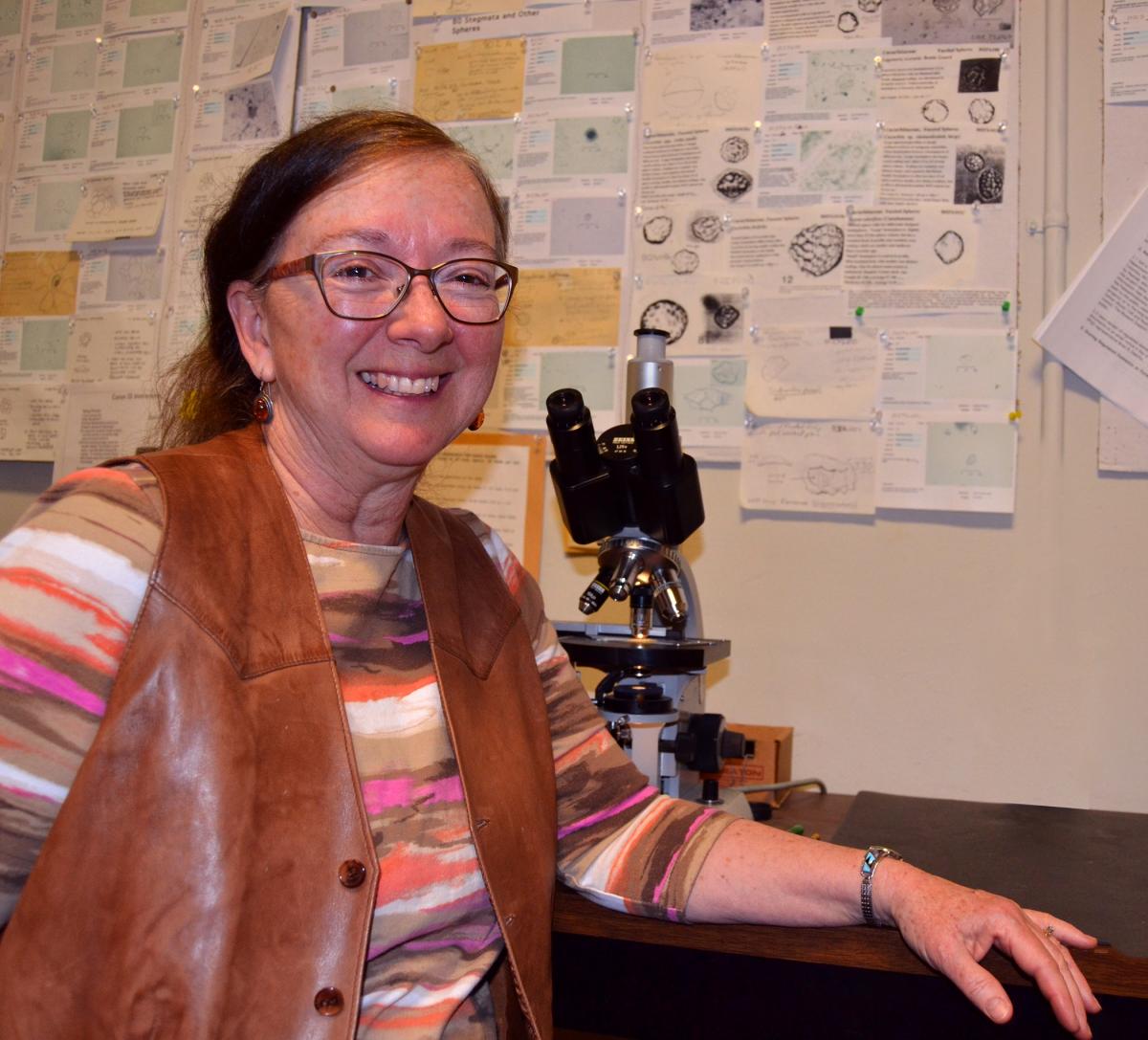 Deborah is nothing short of a giant in her fields of study. Dr. Pearsall received her BA in Anthropology from the University of Michigan, followed by an MA and PhD from the University of Illinois, Champaign-Urbana, both in Anthropology. After graduating, Deborah went on to a long career at the University of Missouri, where she remains a professor emerita in the Anthropology Department.
Deborah is nothing short of a giant in her fields of study. Dr. Pearsall received her BA in Anthropology from the University of Michigan, followed by an MA and PhD from the University of Illinois, Champaign-Urbana, both in Anthropology. After graduating, Deborah went on to a long career at the University of Missouri, where she remains a professor emerita in the Anthropology Department.
Dr. Pearsall has been a pioneer in the world of ethnobiology and paleoethnobotany. In fact, she's written the books on the topics! Deborah wrote Paleoethnobotany: A Handbook of Procedures (Third edition 2015) and was one of the co-editors for Ethnobiology. She is also the author of Plants and People in Ancient Ecuador (2004), Case Studies in Paleoethnobotany (2019), and The Origins of Agriculture in the Neotropics (1998, D. Piperno and Pearsall). Dr. Pearsall has also long shared her expertise through service on a number of boards and committees, including work as an editor for the Journal of Ethnobiology, as well as serving as the President and President-elect for the Society of Ethnobiology. In 2002 she was honored by the Society for American Archaeology with the Fryxell Award for Interdisciplinary research. Deborah also maintains an online phytolith database of the data collected during the Phytoliths in the Flora of Ecuador Project (PFE), which ran from 1997 to 2008, and provides diagnostic phytolith types for the region for use of archaeological and paleoethnobotanical applications.
Please join us in congratulating Dr. Pearsall on this heartily deserved honor!
2019 Dr. Nancy Turner
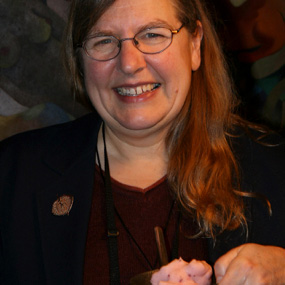 Nancy Turner (Professor Emeritus, Environmental Studies, University of Victoria)
Nancy Turner (Professor Emeritus, Environmental Studies, University of Victoria)
Dr. Turner is professor emeritus in the Environmental Studies Department at the University of Victoria in British Columbia. Dr. Turner is an ethnobotanist who has worked extensively with the Indigenous peoples of the Pacific Northwest for the past 40+ years. Dr. Turner’s contributions to the field have been nothing short of prolific—her condensed curriculum vitae includes 26 pages of books and papers she’s authored or co-authored, presentations she’s made across the globe, and professional appointments she has held throughout her extensive career. To further highlight Dr. Turner’s amazing contributions to the field, we’ve included a few excerpts from her nomination packet:
“Nancy was at that forefront of a myriad of scholarly concepts and ideas that arose from her careful listening to and respect for Indigenous knowledge. A few of these concepts that have now become commonplace in scholarly conversations are: cultural keystone species and places, knowledge refugia, eco-cultural restoration, and Northwest Peoples as cultivators. The list is long and the impact great.”
“Nancy’s mentorship far surpasses the classroom, and her passion for plants, people, and place are shared freely and with the greatest humility, kindness, and integrity.”
“She has now written a ‘five-foot shelf’ of works, almost all of them with First Nation coauthors as well as consultants.”
“We believe that Nancy’s greatest contribution to our Society, and indeed to the discipline of Ethnobiology, is that she inspires all of us to see the value and beauty in other people’s knowledge, and to create a world where diversity – both ecological and cultural – is something that is embraced and protected.”
2018 Dr. Gail Wagner
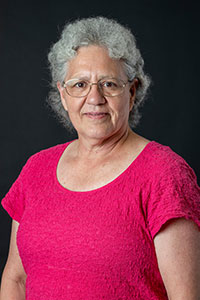
The Awards Committee is proud to present the 2018 Distinguished Ethnobiologist Award to Gail Wagner of the University of South Carolina.
Dr. Wagner’s work has made broad contributions to the fields of archaeology and ethnoecology, including her extensive paleobotanical research on the Mississippian period, her experimental garden work to revive traditional crops, and her large body of research surrounding human foodways in times of cultural change.
Gail’s substantial career embodies the mission of the Society of Ethnobiology: to promote the understanding of the past and present relationships between humans and their biological worlds. In addition to her research, Dr. Wagner has developed an extensive series of online resources for teaching and sharing ethnobotany, archaeology, and anthropology study materials, including dozens of videos and open-source guides. Her nominees for this year’s award were a mix of academic and non-academic colleagues – a true testament to her work’s wide influence and reach.
2017 Dr. Steve Emslie and Dr. Steve Weber (the "Two Steves")
The Society of Ethnobiology announces Steve Emslie and Steve Weber as joint recipients of the 2017 Distinguished Ethnobiologist (DEB) award for 2017. Steve Emslie is a Professor in the Department of Biology and Marine Biology at the University of North Carolina. Steve Weber is a Professor in the Department of Anthropology at Washington State University.
The nomination of Steve Emslie and Steve Weber was coordinated by Dana Lepofsky, and was supported by the esteemed ethnobiologists Gene Anderson, Cecil Brown, Richard Ford, Kay Fowler, Paul Minnis, Chelsey Armstrong, Jade D'Alpoim Guedes, Andrew Gillreath-Brown, Joyce Lecompte-Mastenbrook, Alex McAlvay, Marsha Quinlan, and Mario Zimmermann.
In her nomination letter for Steve Emslie and Steve Weber, Dana Leposky wrote: “As founders of our Society and our Journal some 40 years ago when they were sassy young graduate students, we have much to be grateful to them for. Little did they know that their vision and hard work would turn into the world’s leading ethnobiological society. In the early days of our Society, beginning with the first conference in 1978, “the Steves” worked tirelessly to promote ethnobiology and in deed to create a cohesive ethnobiology community.”
“Our first two conferences, organized by the Steves in Arizona had about 28 oral presentations and about 50 attendees” wrote Lepofsky. “Compare that to our most recent conference in Arizona, where 146 people presented talks! After those first conferences, the Steve’s created the Journal (and distributed it out of Steve Weber’s garage), and then the Society (and all the legal paperwork and structure that entailed). In 1981 - 1983, both Steves were “co-directors” of the first years of publications of our then bi-annual journal. And then in 1983-1986, Steve W. served as our first President, and Steve E. as our first Secretary/Treasurer (which was a single position up to about 10 years ago). As the supporters of this nomination note, their understanding of the need for a cohesive ethnobiology community, was timely, and in the end, foundational for the discipline.”
“By creating a new scientific society the two Steves did all of us a favor,” testified Richard Ford (Professor Emeritus, University of Michigan), “because the other scientific societies in biology and anthropology were too compartmentalized to envision a field that would integrate all aspects of biology and show its importance for human cultures. They deserve thanks from all of us and to bestow this award on both of them together is most appropriate.”
“Their own unique backgrounds,” according to Alex McAlvay (Graduate Student, University of Wisconsin, Madison), “led them to form an organization that brings the work of ethnozoologists and paleoethnobiologists into cross-pollination with ethnobotanists, an inclusivity that has marked the SoE from its inception. Students accustomed to larger anthropology, archaeology, and biology meetings quickly discover that this is a very different type of organization, less dominated by ego, competition, and hierarchy.”
In her note in support of the nomination, Kay Fowler (Professor Emerita, University of Nevada-Reno) wrote, “Steve Emslie and Steve Weber each have “made his own contributions to the scholarly discourse of the enterprise through continued work in avian ecology and paleoecology in Antartica and North America (Steve Emslie) and the origins of agriculture and crop domestication in India (Steve Weber). The scholarly world owes them a great debt, as does the Society of Ethnobiology.”
According to Mario Zimmermann (PhD Candidate, Washington State University), “Steve Weber believes that archaeobotanical data can and should be used to help present-day farming communities. As an archaeologist he is more than aware that cultures and their environments change constantly. Today people in southern and eastern Asia, both regions where he conducted extensive fieldwork, are among those who suffer most from extreme climatic events. For decades, Steve has provided these people with valuable lessons from the past. As an actively engaged ethnobiologist, he has worked to promote a human-environment relationship that is based on understanding and resilience.”
Alex McAlvay elaborated by adding, “Steve Weber and Steve Emslie have been prolific in their paleoethnobotanical and paleozoological research, but their output is many times more if one were to include the products of collaboration made possible by creating the Society of Ethnobiology. The special space they fostered has led to countless intellectual collisions and collusions resulting in not only tangible products of collaborations, but intangible friendships, stimulation, and inspiration.”
Jade d'Alpoim Guedes (Assistant Professor, Washington State University) wrote, “I cannot think of a better person to nominate for the distinguished ethnobiologist award than Steven Weber. As a budding paleoethnobotanist working in Asia, the pioneering work carried out by Steven Weber set the standard for my own career and for those of many other young archaeobotanists.”
“Steve [Weber’s] position at Washington State University has been based at our primarily undergraduate campus of Washington State University Vancouver,” explained Jade, “and while there Steve has mentored generations of undergraduate and graduate students. It is indeed thanks to his efforts that our department first developed a BA in Anthropology at this campus location. Steve mentored a large number of undergraduates in his lab and it is a testament to his mentoring that each of these students produced publishable papers during their BA. He has also been active in training international scholars. “
To learn more about how the Steves founded our Society, and even how they chose our stick figurine logo, visit:
- https://ethnobiology.org/interview-steve-weber-and-steve-emslie-founding-society-ethnobiology-hd-5-june-2014-1026
- https://ethnobiology.org/origin-society-logo
The DEB award honors ethnobiologists who have made outstanding contributions to the field of ethnobiology and who have advanced the goals of the Society. In recognition of these contributions, the recipient will be awarded a lifetime honorary membership to the Society of Ethnobiology.
“The 40th anniversary of the Society’s founding is an excellent time to recognize their contributions,” explained Paul Minnis. “Without their initial efforts in founding the Society, we would not be, in my opinion, the most intellectually diverse and active organization promoting ethnobiology. It should be pointed out that they conceived the Society as a bridge across disciplinary boundaries. While the “the two Steve’s” were archaeologists, one interested in animals and the other in plants, the Society from the beginning transcended their personal interests.”
2016 Dr. Gary Nabhan
We are honored to announce Dr. Gary Paul Nabhan as the 2016 Distinguished Ethnobiologist. Here are some of the things that the nomination letters said about him: "Gary is one of the most distinguished and widely recognized ethnobiologists in the world. He is regarded as the ‘father of the local food movement’ (Utne Reader) and has had his work featured in the New York Times, Time Magazine, Mother Earth News and many other popular outlets... Gary's contributions to SOE have been numerous and long standing. He was lead author on an important article in the first issue of the Journal of Ethnobiology, was an original member of the editorial board...Gary has attended nearly every SOE conference, was an organizer of both the 3rd and 13th annual conferences in Arizona, and delivered the keynote address at the 2013 conference."
Gary has worked for almost five decades in applied ethnobiology to help facilitate socially just environmental movements. As noted on Gary's blog, he was among the earliest researchers to promote native foods in preventing diabetes, especially in his role as a co-founder and researcher with the nonprofit Native Seeds/SEARCH. Gary is Director of the new Center for Regional Food Studies at the University of Arizona. His newly edited anthology, The Future of Ethnobiology, will be released the week of the annual conference and includes collaborations with individuals from many different cultures and disciplines. As Brother Coyote, he is a professed brother in the Order
2015 Dr. Cecil Brown
The Society of Ethnobiology is proud to present the Distinguished Ethnobiologist Award 2015 to Professor Emeritus Cecil Brown of Northern Illinois University. Dr. Brown's impressive career highlights the depth and breadth of the Society. His extensive scholarship has made remarkable contributions to ethnobiology, including his innovative approaches to classification and nomenclature of biota; implicational universals in naming of plants; marking reversals in names of animals and plants; linguistic evidence for the origins of domesticates; and the origins of life form terms. He has been a very active member of the Society since its founding, having also served as President, and has a visible record of helping our younger members and collaborating with diverse scholars pursuing ethnobiological interests. The Awards Committee, on behalf of the Society of Ethnobiology, is honored to be able to present the 2015 Distinguished Ethnobiologist Award to Dr. Cecil Brown. The award will be presented at the Society Business Meeting which will be held on Friday, May 8, 2015, in Santa Barbara in conjunction with the annual conference.
2014 Dr. Eugene Hunn
The Awards Committee of the Society of Ethnobiology is delighted to announce that Dr. Eugene Hunn, Professor Emeritus of Anthropology at the University of Washington, has been selected to receive the Distinguished Ethnobiologist Award at our forthcoming conference in Cherokee. Professor Hunn is well known for his ethnobiological fieldwork across the North American continent, from Alaska to Mexico. He has also made outstanding contributions to theory and method in ethnobiology. Professor Hunn has also worked tirelessly to contribute his expertise to the benefit of the communities with whom he has carried out pioneering fieldwork of the highest caliber. In addition to his noted professional contributions, as anthropologist and ethnobiologist,
Professor Hunn has earned the reputation of birder par excellence. He has also been teacher and mentor to several ethnobiologists of the current generation; and as a member of the Society since its earliest days, he has also provided inestimable service to it in numerous capacities, including host of the annual conference, editor of the Journal of Ethnobiology, and President of the Society of Ethnobiology. Please join us in Cherokee to celebrate the many accomplishments of the distinguished scholar and activist in the cause of ethnobiology, Dr. Eugene Hunn.
2013 Dr. Eugene Anderson
The Society’s Board of Directors recognized Dr. Anderson’s honorable record by presenting him with the DEB Award at the Membership Meeting in Denton, Texas on the afternoon of Friday, May 17th during our annual conference. Following the award presentation, Dr. Anderson delivered a unique and eloquent acceptance speech at the annual business meeting. Eugene N. Anderson is the recipient of the Society of Ethnobiology’s 2013 Distinguished Ethnobiologist Award due to his outstanding contributions to the discipline of Ethnobiology and his contributions to advancing the goals of our beloved organization. Dr. Anderson is Professor of Anthropology, Emeritus, at the University of California, Riverside. He received his Ph.D. in anthropology from the University of California, Berkeley, in 1967. He has done research on ethnobiology, cultural ecology, political ecology, and medical anthropology, in several areas, especially Hong Kong, British Columbia, California, and the Yucatan Peninsula of Mexico. His books include The Food of China (Yale University Press 1988), Ecologies of the Heart (Oxford University Press 1996), Political Ecology of a Yucatec Maya Community (University of Arizona Press 2005), and The Pursuit of Ecotopia (Praeger 2010).
2012 Dr. Catherine (Kay) Fowler
The Society of Ethnobiology is pleased to announce the second recipient of its Distinguished Ethnobiologist Award, Dr. Catherine (Kay) Fowler. Dr. Fowler is Professor Emerita at the University of Nevada, Reno and was recently elected to the National Academy of Sciences. She is internationally recognized as a pioneer in the study of traditional ecological knowledge, having spent decades collaborating with, and learning from, the peoples of the Great Basin. Learn more about Dr. Fowler and her work at http://ethnobiology.org/news/interview-ethnobiologist-catherine-kay-fowler.
2011 Dr. Richard Ford
The Society of Ethnobiology is pleased to announce that Dr. Richard Ford is the first recipient of our "Distinguished Ethnobiologist Award". Dr. Ford's long history of mentorship and scholarship exceeds the criteria of the award: to honour an ethnobiologist who has made outstanding contributions to the discipline of ethnobiology and to our Society.
Dr. Ford's research in the American Southwest and elsewhere bridges disciplines such as ethnobotany, paleoethnobotany, and ethnoecology. His teaching, in both formal and informal settings, has inspired people from many communities, including academic ethnobiologists, Native Americans, and the general public. Today, he is using his accumulated knowledge to assist Native American tribes with legal cases and to preserve ancient heritage.
Dr. Ford formally accepted his award and addressed the Society at our 2011 annual meetings in Columbus, Ohio.
